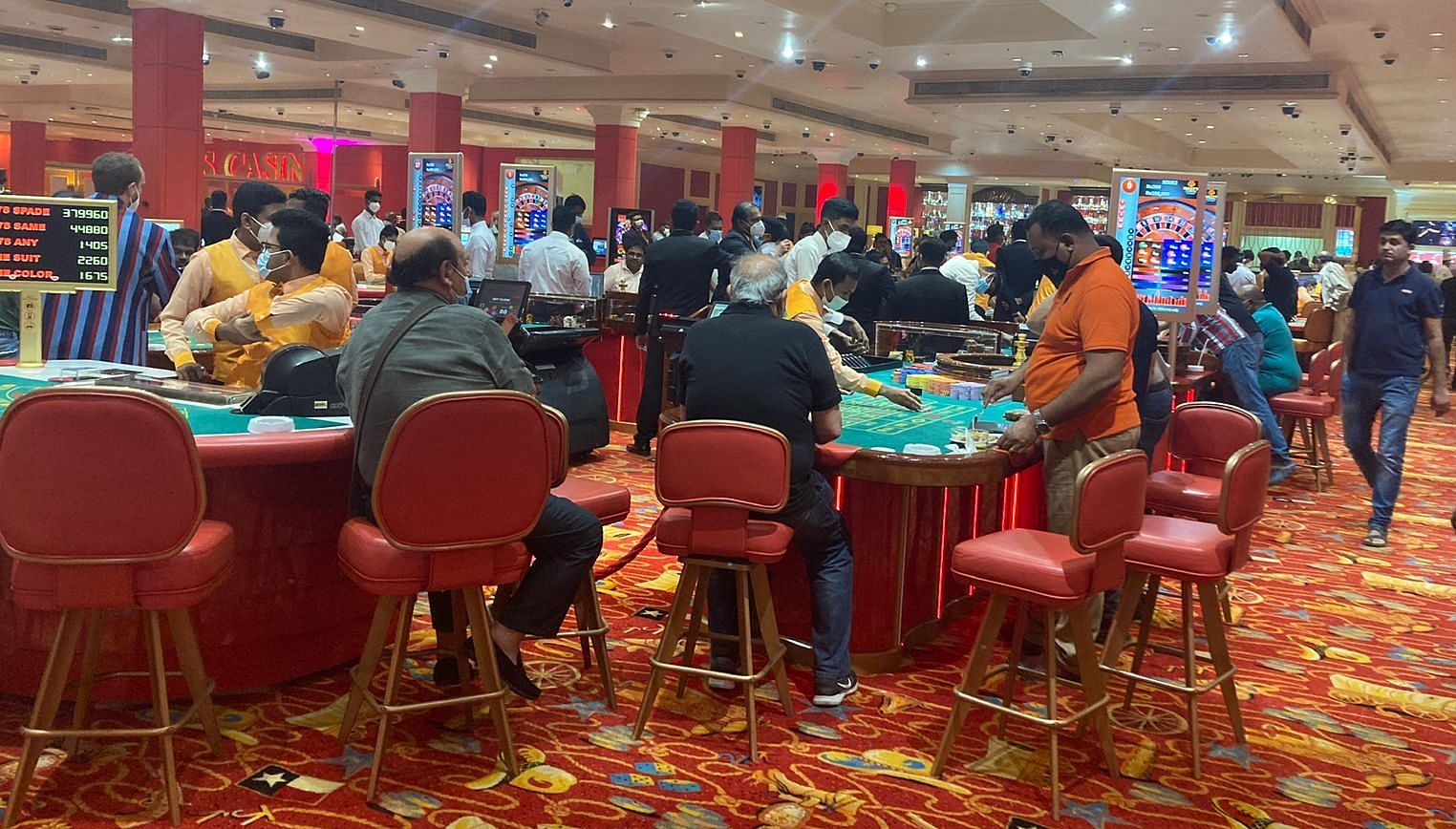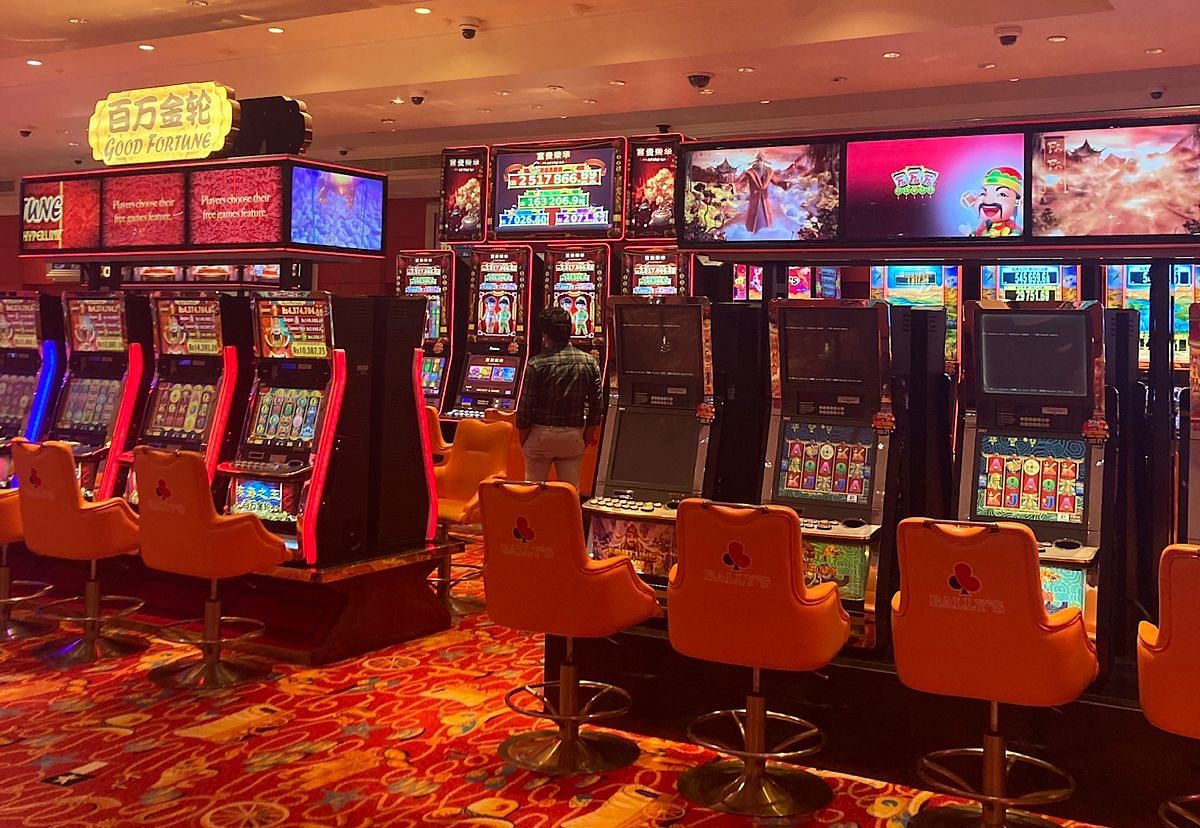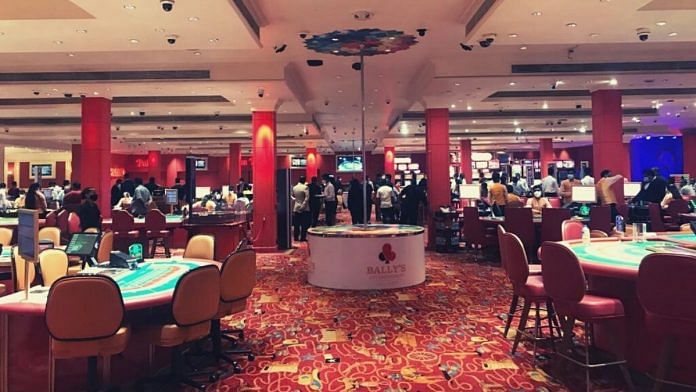Colombo: The streets of Colombo are dark at night with street lights turned off to conserve electricity. But occasionally, a pool of light from a hotel, fancy restaurant, or high-rise apartment breaks through the sheet of darkness. It’s a reminder that behind closed doors, the city still offers what it used to — like casinos and clubs — for those who can afford it.
The upper-middle class and the elite in Colombo have largely remained unaffected by the ongoing economic crisis in Sri Lanka — except for power cuts. But even among the ‘affected’, not everyone suffers equally… The hotels and high-rise apartment complexes, which can afford it, have stocked up on fuel to ensure their generators and power backups function smoothly.
At Cheers, an upmarket pub in Colombo, people lower their voices to a whisper to discuss certain people. “I can understand the man stealing to feed his kids, not the man stealing to buy a bloody island in the Maldives,” says someone, in passing reference to how the Sri Lankan elite spend their money, even during an economic crisis. They don’t want others to know who they’re talking about — in Sri Lanka today, much of the anger is directed towards the Rajapaksas and their closest supporters, but there are still fears about bad-mouthing them in public.
“The upper middle class and the elite are divided into those who support the Rajapaksa government and those who are earning legitimate money,” says Rehan Jayawickreme, vice chairman of the Samagi Jana Balawegaya youth wing and former mayor of the town of Weligama. “Most of the money the wealthy have is overseas anyway. The upper-middle class who are decent human beings are feeling a pinch because the lifestyles they’re used to are obviously gone,” he adds.
People — including members of the upper echelons — are baulking at displays of wealth during the current crisis. But life continues as normal for those who can afford it. A cursory search reveals several live events, performances, and parties at nightclubs across the city, and luxury establishments like One Galle Face Mall have stayed open and active. Bars like Cheers have been consistently full for several evenings in a row.
Also Read: ‘We have nothing to give our children’ — Sri Lankans now just waiting for things to get better
Sri Lanka’s elite and casino tourism
While Sri Lanka reports low poverty rates, income inequality has only grown. Over half of the total household income of the island nation goes to the richest 20 per cent. Some reports estimate that around 75 per cent of the State’s budget is controlled by the Rajapaksa ministers in government — until, of course, the cabinet resigned last week amid the ongoing political crisis.
Former government officials have alleged that the Rajapaksa family have hidden their multibillion-dollar fortune in bank accounts in Dubai, the Seychelles, and St. Martin. For example, according to the Pandora Papers, Nirupama Rajapaksa (a member of the family and former parliamentarian) and her husband Thirukumar Nadesan, had amassed offshore holdings of $18 million, including priceless artwork and property. At least eight members of the Rajapaksa family and their supporters have been charged with crimes, including embezzlement and corruption, and are being investigated by authorities.
The pandemic only exacerbated these inequalities — and as the heavily tourism-dependent economy took a hit, certain monopolised businesses were able to reap the profits.

Casinos have stayed open in Colombo throughout the heightened economic crisis over the last few months, managing to function for 24 hours despite acute fuel shortages and frequent power cuts and resistance from the Buddhist clergy. Casinos in Sri Lanka have been a cash cow for the local economy, drawing hundreds of tourists every week, with a majority coming from India. There are several casino packages that tourists can book, including flight tickets and hotel stays.
Bally’s Casino is one of Colombo’s main attractions. Inside, life goes on as normal. Huge groups of tourists mingle with a few high-profile Sri Lankans. Ukrainian dancers provide entertainment throughout the night. The management knows many players personally — some of them are regulars, flying down from all across India as often as twice a month to gamble.
A group of Indian tourists told ThePrint they were having a great time in Sri Lanka. “We were worried about coming when we heard about the situation here, but our travel agent told us not to worry,” says one visitor from Mumbai. “I’m glad we came, we’re having a great time and haven’t experienced any issues.”
One local businessman at another popular establishment, Marina’s Casino, seemed embarrassed to be there. “I feel bad, but what to do. I’m here for entertainment, I guess.”
Also Read: Glitz, glamour and gambling: Behind China’s secret societies and crime syndicate
Weathering the storm
Casinos have had to tone down, however, to match skyrocketing prices and fuel shortages. Bally’s, for example, only offers one tour package now and can’t guarantee the full extent of luxurious food and service they usually do.
They’re also clear that the constantly changing prices shouldn’t affect their customers’ game. “We’re not a foreign exchange. We accept different currencies,” says Telles Loy, deputy head of marketing at Bally’s. Next to him, a Chinese gentleman places his opening bet of Rs 1.5 lakh.
“We are catering to foreign people, and we don’t want them to be affected by what’s outside. Irrespective of what’s happening, we don’t want to give them a negative feeling,” adds Loy.
Bally’s reopened after the pandemic in December 2021 and has since averaged between 500 and 600 visitors a day. The number goes up to around 1,000 on the weekend, which includes tourists from India, Pakistan, Bangladesh, China, and the Middle East. It’s open 24 hours a day and its power generator requires 75 litres of fuel an hour to keep things running.
“Bally’s brings tourism to Sri Lanka,” says general manager Tony Macmillan. They’re used to being the only constant as crises come and go. When ThePrint asked Macmillan how Bally’s was dealing with the economic crisis, he asked “Which one?”
Also Read: Online gaming or gambling? Why fantasy sports, rummy and poker are stuck in controversy
People are paying attention
Casinos and clubs might be adding to the local economy, but the excesses of the wealthy aren’t — and Sri Lankans are paying attention.
“When we talk about wealth in this country, we have to talk about politicians and their closest supporters too,” says Saritha Irugalbandara, activist and consultant. “Even during the pandemic, the government sided with big business to keep things open — putting people at risk to line their pockets.” Some of these billionaires thank President Gotabaya Rajapaksa for his choice to keep the economy running.

For example, Bally’s casino is owned by Sri Lankan businessman Dhammika Perera, one of the island nation’s wealthiest men. He was in the running last week to be the new Secretary to the Ministry of Finance after Prime Minister Rajapaksa’s cabinet resigned. According to reports from 2021, Perera’s Hayleys conglomerate earned almost 90 billion Sri Lankan rupees, with a profit of 6.4 billion Sri Lankan rupees in the first quarter of 2021. Another conglomerate, LOLC, owned by Sri Lankan billionaire Ishara Nanayakkara, earned 55 billion Sri Lankan rupees in 2021 with a profit of 4 billion rupees.
I’m losing my mind thinking about how much money the elite class in SL actually have. Stolen money. I can’t compute.
When I see numbers, it doesn’t make much sense to me, I need to visualize it. Look at the way they are living here, I cannot process pic.twitter.com/pLHbAfyglh
— Emmz?? (@Pineapples911x) April 5, 2022
Senura Yapa Senadipathi, whose father Nissanka Senadhipathi is close with the Rajapaksas, posted an appeal on his Instagram stories to stop harassing him and his family. Senadhipathi is chairman of the influential Avant-Garde Company, a maritime security company, and was recently accused by a member of the Sri Lankan parliament of stealing public money. The family left the country for the Maldives earlier this week.
Others have already started planning their exit routes from Sri Lanka if needed. In the meantime, mothers are planning playdates for their children for relieving stress, and well-off couples have booked staycations to distract themselves.
But back at Cheers, the conversation continues in hushed tones. One person says she’s having difficulties importing raw materials like tiles to build her house and sighs about the inflated prices. Someone else mentions that they’ve donated their extra generator to their children’s school. There’s talk of going to attend a protest at Temple Trees, the official residence of Prime Minister Mahinda Rajapaksa.
Everyone’s aware of their privilege, but no one’s sure what to do with it.
This is part two of the three-part series ‘Paradise Lost‘ by Vandana Menon on the impact of Sri Lanka’s economic crisis on citizens.
(Edited by Srinjoy Dey)



